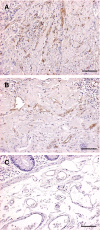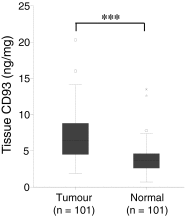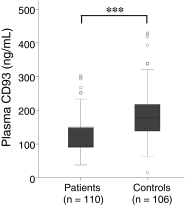CD93 gene polymorphism is associated with disseminated colorectal cancer
- PMID: 26008729
- PMCID: PMC4471320
- DOI: 10.1007/s00384-015-2247-1
CD93 gene polymorphism is associated with disseminated colorectal cancer
Abstract
Purpose: Cluster of differentiation 93 (CD93) is involved in apoptosis and inflammation and has a suggested role in angiogenesis, and all of which are involved in the development and dissemination of cancer. We evaluated the expression of CD93 and the association with two single nucleotide polymorphisms (SNPs), rs2749812 and rs2749817, as possible biomarkers in colorectal cancer (CRC).
Methods: Tissue levels and plasma levels of CD93 were measured using an enzyme-linked immunosorbent assay (ELISA). Expression of CD93 was determined by immunohistochemistry, western blot and gene expression analysis. Genotype frequencies were established for the SNPs by real-time polymerase chain reaction (PCR), and the association with tumour stage and survival was analysed.
Results: Total CD93 levels were 82% higher (P < 0.001) in tumours compared to matched normal tissues. Mean levels of soluble CD93 in plasma were 30% lower (P < 0.001) in the patients compared to the controls. The T/T genotype of SNP rs2749817 was more common in stage IV patients, with consequently higher risk of CRC death (T/T vs. C/C and C/T; hazard ratio (HR) = 1.73, 95% confidence interval (CI) = 1.11-2.67, P = 0.014), and was associated with a higher risk of CRC recurrence after radical operation (T/T vs. C/C and C/T; HR = 2.07, CI = 1.22-3.51, P = 0.007).
Conclusions: We showed that the T/T genotype of SNP rs2749817 is associated with disseminated cancer at diagnosis and an increased recurrence rate after radical operation. Patients with this genotype may benefit from early identification.
Figures






Similar articles
-
Role of CD93 in Health and Disease.Cells. 2023 Jul 4;12(13):1778. doi: 10.3390/cells12131778. Cells. 2023. PMID: 37443812 Free PMC article. Review.
-
Psoriasis and Pro-angiogenetic Factor CD93: Gene Expression and Association with Gene Polymorphism Suggests a Role in Disease Pathogenesis.Acta Derm Venereol. 2017 Aug 31;97(8):916-921. doi: 10.2340/00015555-2682. Acta Derm Venereol. 2017. PMID: 28421233
-
Plasma CD93 concentration is a potential novel biomarker for coronary artery disease.J Intern Med. 2011 Sep;270(3):229-36. doi: 10.1111/j.1365-2796.2011.02364.x. Epub 2011 Mar 21. J Intern Med. 2011. PMID: 21332844
-
Genetic variance and plasma concentration of CD93 is associated with cardiovascular mortality: Results from a 6.7‑year follow‑up of a healthy community‑living elderly population.Mol Med Rep. 2020 Dec;22(6):4629-4636. doi: 10.3892/mmr.2020.11555. Epub 2020 Oct 1. Mol Med Rep. 2020. PMID: 33173973 Free PMC article.
-
CD93 and related family members: their role in innate immunity.Curr Drug Targets. 2008 Feb;9(2):130-8. doi: 10.2174/138945008783502421. Curr Drug Targets. 2008. PMID: 18288964 Review.
Cited by
-
CD93 Correlates With Immune Infiltration and Impacts Patient Immunotherapy Efficacy: A Pan-Cancer Analysis.Front Cell Dev Biol. 2022 Feb 15;10:817965. doi: 10.3389/fcell.2022.817965. eCollection 2022. Front Cell Dev Biol. 2022. PMID: 35242761 Free PMC article.
-
CD93 overexpresses in liver hepatocellular carcinoma and represents a potential immunotherapy target.Front Immunol. 2023 Jul 7;14:1158360. doi: 10.3389/fimmu.2023.1158360. eCollection 2023. Front Immunol. 2023. PMID: 37483608 Free PMC article.
-
CD93 and dystroglycan cooperation in human endothelial cell adhesion and migration adhesion and migration.Oncotarget. 2016 Mar 1;7(9):10090-103. doi: 10.18632/oncotarget.7136. Oncotarget. 2016. PMID: 26848865 Free PMC article.
-
Role of CD93 in Health and Disease.Cells. 2023 Jul 4;12(13):1778. doi: 10.3390/cells12131778. Cells. 2023. PMID: 37443812 Free PMC article. Review.
-
DNA methylation identifies genetically and prognostically distinct subtypes of myelodysplastic syndromes.Blood Adv. 2019 Oct 8;3(19):2845-2858. doi: 10.1182/bloodadvances.2019000192. Blood Adv. 2019. PMID: 31582393 Free PMC article.
References
Publication types
MeSH terms
Substances
LinkOut - more resources
Full Text Sources
Other Literature Sources
Medical
Miscellaneous

